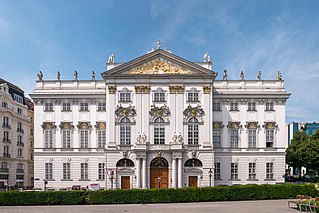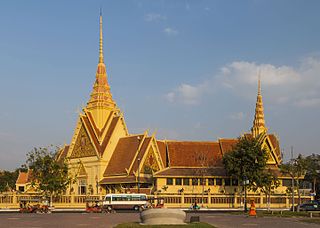The judiciary of Germany is the system of courts that interprets and applies the law in Germany.

The Judicial Yuan is the judicial branch of the Republic of China. It runs the Constitutional Court and oversees all courts of Taiwan, including ordinary courts like the supreme court, high courts, district courts as well as special courts like administrative courts and disciplinary courts. By Taiwanese law, the Judicial Yuan holds the following powers:

The Federal Court of Justice is the highest court of civil and criminal jurisdiction in Germany. Its primary responsibility is the final appellate review of decisions by lower courts for errors of law. While, legally, a decision by the Federal Court of Justice is only binding with respect to the individual case in which it enters, de facto the court's interpretation of the law is followed by lower courts with almost no exception. Decisions handed down by the Federal Court of Justice can only be vacated by the Federal Constitutional Court for violating a provision of the German constitution, the Basic Law.

The Federal Ministry of Justice, abbreviated BMJ, is a cabinet-level ministry of the Federal Republic of Germany. Under the German federal system, individual States are most responsible for the administration of justice and the application of penalties. The Federal Ministry of Justice devotes itself to creating and changing law in the classic core areas related to Constitutional law. The Ministry also analyzes the legality and constitutionality of laws prepared by other ministries. The German Federal Court of Justice, the German Patent and Trade Mark Office (GPTO), and the German Patent Court all fall under its scope, including affairs on court administration. The ministry is officially located in Berlin.

The judicial system of Turkey is defined by Articles 138 to 160 of the Constitution of Turkey.

The law of Brazil is based on statutes and, partly and more recently, a mechanism called súmulas vinculantes. It derives mainly from the European civil law systems, particularly the Portuguese, the Napoleonic French and the German.

The Constitutional Court of Korea is one of the highest courts—along with the Supreme Court—in South Korea's judiciary that exercises constitutional review, seated in Jongno, Seoul. The South Korean Constitution vests judicial power in courts composed of judges, which establishes the ordinary-court system, but also separates an independent constitutional court and grants it exclusive jurisdiction over matters of constitutionality. Specifically, Chapter VI Article 111(1) of the South Korean Constitution specifies the following cases to be exclusively reviewed by the Constitutional Court:
- The constitutionality of a law upon the request of the courts;
- Impeachment;
- Dissolution of a political party;
- Competence disputes between State agencies, between State agencies and local governments, and between local governments; and
- Constitutional complaints as prescribed by [the Constitutional Court] Act.

The Court of Cassation of Belgium is the supreme court of the Belgian judiciary. The court is composed of thirty judges with life tenure who are nominated by the High Council of Justice of Belgium and appointed by the Belgian federal government. The court handles cases in the two main languages of Belgium, Dutch and French, and provides certain facilities for cases in German. The court is assisted in its work by a public prosecutor's office and a bar association, which both function separately from other structures. The duty of the public prosecutor's office is to provide advisory opinions to the court on how the law ought to be interpreted and applied. The attorneys of the court's bar association assist litigants in proceedings before the court; in certain cases, their assistance is mandatory.

The Supreme Court of Korea is the highest ordinary court in the judicial branch of South Korea, seated in Seocho, Seoul. Established under Chapter 5 of the Constitution of South Korea, the Court has ultimate and comprehensive jurisdiction over all cases except those cases falling under the jurisdiction of the Constitutional Court of Korea. It consists of fourteen Justices, including the Chief Justice of the Supreme Court of Korea. The Supreme Court is at the top of the hierarchy of all ordinary courts in South Korea, and traditionally represented the conventional judiciary of South Korea. The Supreme Court has equivalent status as one of the two highest courts in South Korea. The other is the Constitutional Court of Korea.

The chief justice of the Supreme Court of Korea is the chief justice of the Supreme Court of Korea. As presiding judge of the grand bench composed of two-thirds of fourteen Supreme Court justices, the chief represents the Supreme Court of Korea. The chief justice is regarded as one of two equivalent heads of judicial branch in Government of South Korea. Another head is the president of the Constitutional Court of Korea. The current chief justice of the Supreme Court of Korea is vacant and Supreme Court Justice Ahn Chul-sang is acting as the chief justice of the Supreme Court of Korea.

In most legal jurisdictions, a supreme court, also known as a court of last resort, apex court, and highcourt of appeal, and court of final appeal, is the highest court within the hierarchy of courts. Broadly speaking, the decisions of a supreme court are binding on all other courts in a nation and are not subject to further review by any other court. Supreme courts typically function primarily as appellate courts, hearing appeals from decisions of lower trial courts, or from intermediate-level appellate courts. A supreme court can also, in certain circumstances, act as a court of original jurisdiction.

The Supreme Court is the highest court in the Kingdom of Spain. The court has original jurisdiction over cases against high-ranking officials of the Kingdom and over cases regarding the legalization of political parties. It also has ultimate appellate jurisdiction over all cases. The Court has the power of judicial review, except for the judicial revision on constitutional matters, reserved to the Constitutional Court.

The judiciary of Malta interprets and applies the laws of Malta, to ensure equal justice under law, and to provide a mechanism for dispute resolution. The legal system of Malta is based partially on English law and partly on Continental law, whilst also being subject to European Union law.

The Judiciary of Brazil is the group of public entities designated by the Brazilian constitution to carry out the country's judicial functions.

The Ministry of Justice is the government ministry of Austria responsible for the administration of justice. The ministry exercises administrative supervision and is charged with the compensation of the judiciary and the prosecutors, manages their office buildings and facilities, and administers the prison system.
The Judiciary of Azerbaijan exercises judicial power in Azerbaijan. Although the Azerbaijan constitution nominally guarantees judicial independence, the executive firmly controls prosecutors and judges. Judges and prosecutors collaborate in Azerbaijan to repress political opponents.

The Supreme Court of Cambodia is the highest court in the judiciary of Cambodia, under the supervision of the Supreme Council of the Magistrature. It is located in the royal capital of Phnom Penh, and is regulated under Article 55 to Article 73 of the 2014 Cambodian Law on Court Organization.

The judiciary of South Korea is the judicial branch (사법부) of South Korean central government, established by Chapter 5 and 6 of the Constitution of South Korea.
Rapporteur Judge or Rapporteur-Judge is a term for number of judicial officials similar to judicial assistant at highest court, usually functioning as rapporteur while having status equivalent to lower ordinary court judges.

Ordinary court or judicial court is a type of court with comprehensive subject-matter jurisdiction compared to 'specialized court' with limited jurisdiction over specific field of matters, such as intellectual property court. Due to its comprehensive feature, ordinary courts usually deal with civil case and criminal case, and treated as core part of conventional judiciary. Especially for common law countries, the term superior court is used for courts with general jurisdiction, compared to courts with limited jurisdiction over minor, petty cases such as small claims court.
















